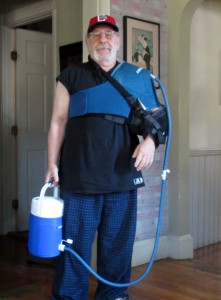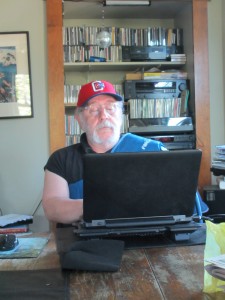by Kent Ballard
It’s maddening when you get an idea that won’t quite jell in your mind. What’s worse are the ideas that jell very nicely but are so abstract you cannot find words to express them.
I was thinking something that has probably occurred to other people before, but a thing that was new to me. I don’t know where this thought came from. I don’t know where the term “metrosexual” came from either. It doesn’t matter. It seems to fit a certain part of the population and we will just accept it and move on.
I’d been thinking about all those JFK assassination conspiracy theories. Not the theories themselves actually, but the sheer amount of information researchers have uncovered over all these years for those three seconds in Dallas. It’s as if that time and place were locked into another reality, a museum somewhere, where the curious could go forevermore and look at it not only from all angles but multiple slices of times and fractions of those seconds. It’s been frozen in perfect three dimensional and temporal space. Things might be a little foggy before Zapruder filmed Kennedy’s reaction to the first shot and they might get alarmingly foggy after the last one, but those three seconds are more real to us today than they were to the people present at the time. From that place and time came thousands of books, television reports, eyewitness interviews, articles, movies, news stories, and memorials and they’re still being written today. I won’t bring up all the arguments. You’ve heard many yourself and you will hear more in the future. Nor will I delve into the two full-blown federal investigations that drew opposing conclusions. They’ve generated their own tonnage of written, visual, and audio commentary.
No, I wasn’t pondering the Kennedy assassination and it really wasn’t about the theories. My idea concerned the freezing in time of an event. My idea was that you could take any event, freeze it in time, go over it repeatedly with a fine-tooth comb, and find many strange and contradictory things about it. You could eventually find anything you wanted to about it. You could make the case that the event never even happened. You could wade into the seemingly endless amount of information gleaned by additional points of view and time lines and the introduction of unlikely characters magnified out of proportion and come to any conclusion you wanted. At some point you would believe this was an event of unprecedented magnitude simply because of all that had been learned about it.
I think if you were to freeze any point in time and look at it from every possible angle, you’d have so much information you could make a strong case for anything. People would come to believe it true. A few more years of research and debate, sprinkled with new findings and new technology to re-comb all the old evidence, and you’d have a public uproar. The people would clamor for Congress to do something! People would have fistfights about the last time you touched your mailbox.
Because I’m going to freeze that moment in time. Freeze the last time you touched your mailbox. We will keep that forever now.
Allow me to dance through time a bit here. It lends itself to my point.
Let’s say the kid at the end of the block briefly caught you in the corner of his cell phone camera while he was filming his friend ride a bike over a little homemade ski jump in his yard. Okay. We have a clear video recording of the event now. You can briefly be seen at the last moment you touched your mailbox. That will become known in the legend I’m about to construct as the “McQueen Film,” which countless writers will explain as a wobbly reference to Steve McQueen’s famous motorcycle jump in “The Great Escape.” It will be considered the gold standard of that frozen moment in time. All other evidence will be measured against those two seconds you appeared on that screen. Relentless investigation will eventually turn up three photographs, two known and one highly disputed, of the same instant too. There will be another much-argued film.
One photo was taken through a second story window across the street by a mother who snapped her sleeping newborn baby. In the lower left quarter of the photo, through that room’s window, down, and across the street you can see part of another house and a person standing at the mailbox. That is you. That’s been verified now, but it took the better part of a decade, much arguing, and fifteen years of technological advances to prove it.
It’ll take two and a quarter million dollars and six years of the best photographic analysis available, but another one of those still pictures shows both you (they proved it was you after the enhancements, color reversals, and shadow comparisons) and a man much farther away in a heavy red plaid winter jacket. But the day was warm. And they’ve proved it through weather records of your city. He’s now known as “the Red Jacket Man” or simply “Red Jacket.” There will a book and two movies about him, none of which agree.
People who were there that day testified a traffic helicopter was going overhead at the time. Some eyewitnesses passed lie detector tests, some didn’t. They made one hell of an effort digging for that film, I’m here to tell you. But they found a fragment on an old DVD. While the copter was banking around to cover a car wreck three quarters of a mile away, someone was taping a rerun of “Laverne and Shirley.” A much-investigated and never-resolved mistake was made at the TV station at that instant. Some argue it was only that. Some argue it was done purposely. But a switch was thrown for six seconds that did not direct the broadcast to a taped commercial, but to a live feed from the chopper on that fateful afternoon. They will look for over a decade for the engineer who threw that switch. They will never find him. But all agree whoever he was, he had his hand on that switch while you had yours on your mailbox. The timing is just too uncanny to be otherwise. Because the Red Jacket Man can be seen from above in it as well, and forensic anthropologists have said he was seen taking the same step as was captured in the now-famous photo including you.
(They also investigated the car wreck being filmed and the chopper pilot flying that day. Most of those theories have been dismissed but die-hard believers in conspiracies were able to draw a great deal of attention to the idea the car had been rocketed by a military attack helicopter flying in the colors of your local TV station. This was linked to conspiracy theories involving PRISM, domestic terrorism, UFOs, and renegade nuclear secrets. Two books were written about the found DVD alone.“Why Did Time Stop?” and “The Fool’s Show-The Morrison DVD” were at total odds with each other.)
The “ghost cat” remains a mystery to everyone. He can clearly be seen in one photo, but nowhere to be found in the second, and is unverifiable in the third and still-disputed picture. All agree the cat could never have been seen from the helicopter, which is the only thing certain about him.
Thirty years from your time PBS and the BBC will co-underwrite a two hour television special about all this. Every photo and film will be taken apart pixel by pixel. There will be a re-airing of scores of old eyewitness testimonies and many new ones will be included. They will film computer reenactments, perform a carefully executed flyby with the same type of helicopter over the exact same neighborhood, have both professional and amateur photographers debate differing types of visual images over the years, and do everything within man’s technological power to recreate that exact moment in time. But…
Do you see what I mean?
Do you see the potential for such a thing getting out of hand? You can’t save history. You can save an accounting of it but you will never save that instant, because if you try you will destroy that thing you’re trying to save. You cannot save a slice in time. It will spoil and go moldy and when it turns black it will never resemble the thing it once was. You cannot save time, nor can you save any point in it.
We will never truly know the past. All we can hope for is a good accounting, someone’s story of what really happened. We hope they told it correctly. We create slices of history with every breath, with every move, and it doesn’t matter if there are witnesses or not. We are justifiably proud of our greater moments and we skulk around the weaker ones, all of us, but in the end there is only one truth and it will never be told.
I had a terrible time getting my head around this idea and how to go about telling it. When I figure it all out I’ll let you know. But if there are kids playing down the block and a helicopter anywhere within earshot the next time you reach for your mail, you might think about this. And if you do you will change the course of history forever.
It’s then not only a question of what histories we don’t know, but what histories never came to be. No language lends itself to this. There cannot be words for thoughts that never were. No wonder I could not describe what I was thinking, because it never came to be.
Tread lightly for your mail next time.




